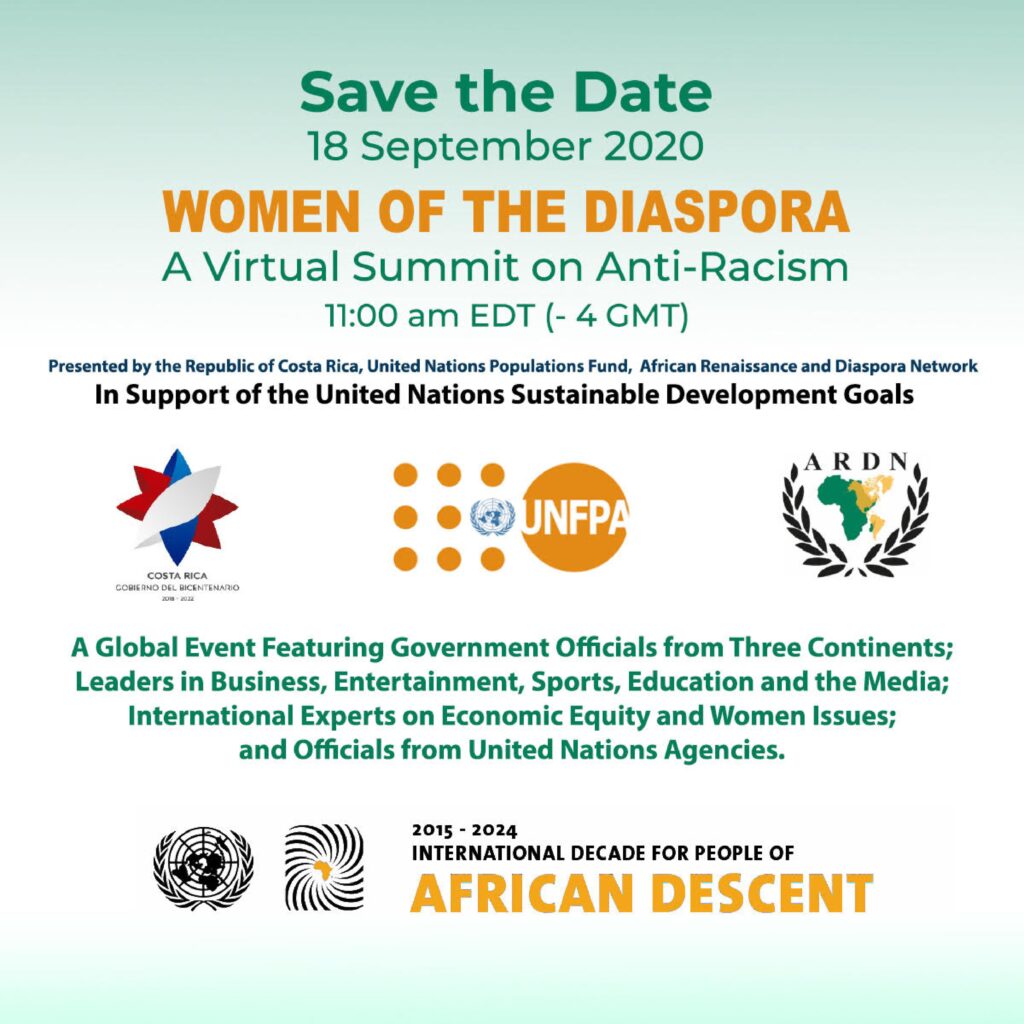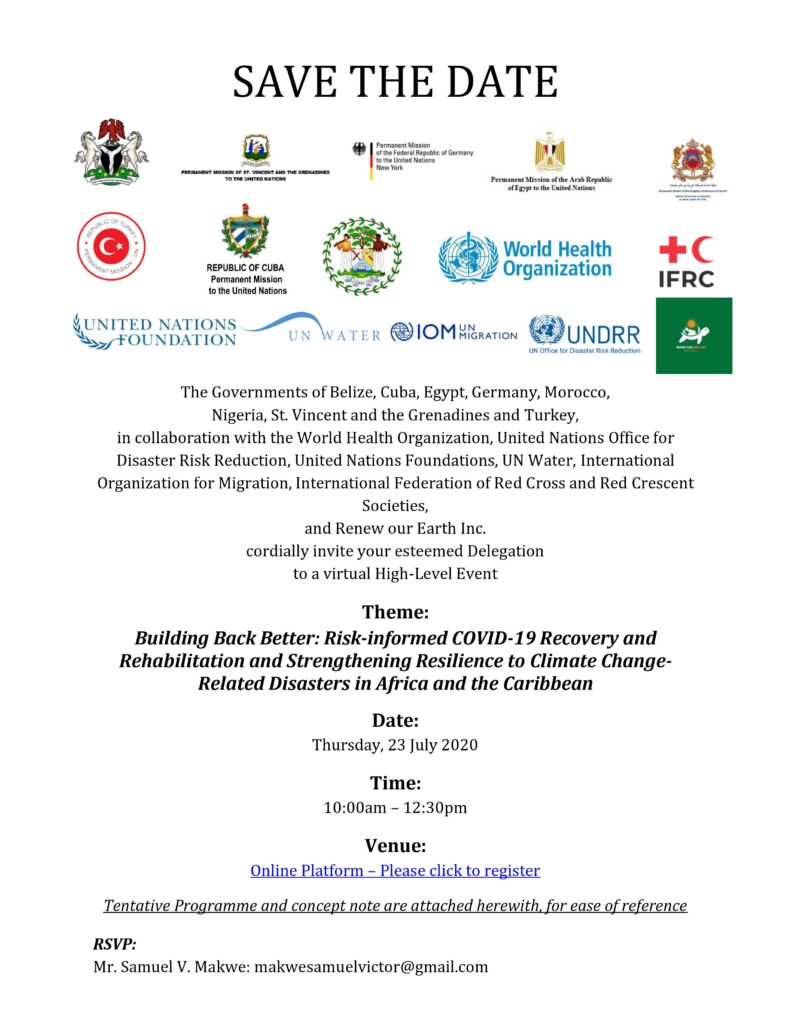

INVITATION
The Governments of Belize, Cuba, Egypt, Germany, Morocco,
Nigeria, St. Vincent and the Grenadines and Turkey,
in collaboration with the World Health Organization, United Nations Office for Disaster
Risk Reduction, United Nations Foundations, UN Water, International Organization for
Migration, International Federation of Red Cross and Red Crescent Societies,
and Renew our Earth Inc.
cordially invite your esteemed Delegation
to a virtual High-Level Event
Theme:
Building Back Better: Risk-informed COVID-19 Recovery and
Rehabilitation and Strengthening Resilience to Climate Change-Related
Disasters in Africa and the Caribbean
Date:
Thursday, 23 July 2020
Time:
10:00am – 12:30pm
Venue:
Online Platform – Please click to register
Tentative Programme and concept note are attached herewith, for ease of reference
RSVP: Mr. Samuel Victor MAKWE: makwesamuelvictor@gmail.com
Concept Note for the side event ON:
BUILDING BACK BETTER: RISK-INFORMED COVID-19 RECOVERY AND
REHABILITATION AND STRENGTHENING RESILIENCE TO CLIMATE
CHANGE-RELATED DISASTERS IN AFRICA AND THE CARIBBEAN
Date: 23 July 2020
Time: 10am: -12:30pm
Registration link:
https://unfoundation.zoom.us/webinar/register/WN_gcIFFYgdSFOhS3Qs54OrFw
Setting the Scene
The COVID-19 pandemic has overwhelmed health systems and the ensuing
socio-economic disaster has exacerbated poverty and inequality within and across
countries. The impact of the disaster has set back the progress made towards the
Sustainable Development Goals (SDGs), including countries in Africa and the
Caribbean. It has also increased the vulnerabilities of countries and the poorest segments
of societies, in these regions, to several other related disasters.
- The impact of COVID-19 pandemic has become a social and economic disaster
and many countries are grappling with climate change-related disasters in the middle of
a devastating pandemic. Climate change-induced disasters have continued to hit
countries and communities, devastate peoples’ livelihoods, spur large-scale
displacements, and weaken critical infrastructures, including health systems. Climate
change is also aggravating natural variability and increasing water related disaster risks
as 40% of the world’s people are affected by water scarcity, and the increasing
incidences of flooding threaten to destroy water points and sanitation facilities as well
as contaminate water sources. As these climate change related disasters increase in
frequency, intensity and variability, countries in Africa and the Caribbean increasingly
bear the brunt. - As world leaders continue to strategize on how to build back better from the
COVID-19 pandemic, it is important that disaster risk reduction and resilience building
are at the core of national recovery and rehabilitation efforts. It has also become
necessary to urgently strengthen community resilience to climate change-related
disasters, better assist affected communities to build back better in the aftermath of these
disasters, and support developing countries to make policy and investment decisions
that reduce existing disaster risk and prevent the creation of new disaster risk. - Resilient recovery from the impacts of COVID-19 will not be possible without
conscious efforts to boost global resilience on all fronts, social, economic and
environmental. It is important to take strategically calculated and measurable collective
actions to support the efforts of countries and communities in special situations. It is
also pertinent that all countries develop multi-hazard disaster risk reduction strategies,
as per Target E of the Sendai Framework, and address systemic risk and potential for
cascading impacts within and across systems, as well as deepen international
cooperation as provided for in Target F of the Sendai Framework.
Objectives of the event
- The event will bring together representatives of Governments, UN Agencies, and
development and humanitarian partners, and encourage the exchange of views, sharing
of experiences, and setting of common goals and targets in line with the 2030 Agenda
for Sustainable Development, particularly those related to sustainable cities, the Sendai
Framework and the Paris Agreement. Accordingly, the event is expected to provide
platform for participants to:
a. Highlight challenges that most African, Caribbean and small island developing
States face when confronted by climate change related disasters, and how the
COVID-19 pandemic is exacerbating their vulnerability and exposure;
b. Articulate possible solutions to the effects of climate related disasters on people
in vulnerable situations and how to address these challenges;
c. Reflect on how to ensure that the effect of COVID-19 and the increasing
frequency of climate related disasters do not result in leaving people from the
affected countries and communities behind in the global efforts to achieve
Agenda 2030 and other global and regional development agendas; and
d. Make connections among various development frameworks including the Sendai
Framework for Disaster Risk Reduction, the Samoa Pathway, the Paris
Agreement and the 2030 Agenda for Sustainable Development (in particular
Goals 1, 11, and 13)
Guiding Questions - Participants are encouraged, in their interventions, to address any or all of the
following guiding questions:
a. How can African and Caribbean countries develop and implement policies and
programmes to strengthen preparedness, build resilience, reduce forced migration
and reduce disaster risk as part of the decade of action and delivery for the SDGs?
b. What international support do African and Caribbean countries need in terms of
capacity, knowledge, access to latest science and technology, and financing
instruments, to develop and implement multi-hazard and multi-sectoral disaster
risk reduction strategies that include climate and pandemic risks, among others?
c. How can we capitalize on our efforts to build back better from the COVID-19
disaster to reduce systemic risks, strengthen resilience to climate change related
disasters, and support the implementation of national priorities for sustainable
development?
Expected Outcomes
- It is expected that the side event would:
a. Raise awareness, augment commitment, and deepen dialogue among Member
States, including representatives of the most affected African, Caribbean and
small island developing States and development partners, as well as key
stakeholders, on mainstreaming resilience to climate change-related disasters in
the COVID-19 recovery and rehabilitation plans; and
b. Synthesize views expressed by participants and present the key messages as
possible policy recommendations for mitigating climate change disasters and
addressing the consequences of climate change on the socio-economic livewire
of communities.
Format
- It is envisioned that the event would be comprised of four segments:
a. An opening segment with keynote addresses by high level participants;
b. A panel session with experts’ presentations on the various aspects of the
overarching theme of the event;
c. Interactive session/sharing of perspectives and brief comments by participants;
d. Response by the panellists and closing remarks.
Expected Participants - It is expected that the event would be attended by:
a. Representatives of UN Member States;
b. Representatives of relevant UN entities, and other International Organisations;
c. Representatives of Africa and Caribbean regional and sub-regional organisations;
d. Representatives of major development partners;
e. Representatives of major Civil Society Organizations (CSOs), the Private Sector,
Academia, and Interfaith communities.
PROGRAMME
BUILDING BACK BETTER: RISK-INFORMED COVID-19 RECOVERY AND
REHABILITATION AND STRENGTHENING RESILIENCE TO CLIMATE CHANGE-
RELATED DISASTERS IN AFRICA AND THE CARIBBEAN
Date: 23 July 2020 | Venue: Online Platform (see below) | Time: 10:00am-12:30pm
OPENING SEGMENT:
Moderator: Barr. Ugoji Eze, Main Representative, BEFA Women and Child Care Foundation
10:00 a.m. –
10:05 a.m.
Opening remarks by the President of the UN General Assembly
10:05 a.m. –
10:10 a.m.
Remarks by the Assistant Secretary General Selwin Hart, on behalf of the UN
Secretary-General
10:10 a.m. –
10:15 a.m.
Remarks by Hege Røttingen, Deputy Director, Norwegian Ministry of Foreign
Affairs, Section for Partnerships, Governance and Development Financing
SECOND SEGMENT:
Panel discussion on options and strategies for building back better and strengthening resilience
to climate change-related disasters in Africa and the Caribbean
Moderator: Mr. Thure Krarup, Executive Director for Sustainable Development Initiatives, UN
Foundation
10:20-10:25a.m. Mr. Xavier Castellanos Mosquera, Under Secretary General, National Society
Development and Operations Coordination, International Federation of Red
Cross and Red Crescent Societies (IFRC)
10:30-10:35a.m. Ms. Dina Ionesco, Head – Migration, Environment and Climate Change
Division, IOM Headquarters – Geneva
10:35-10:40a.m. Mr. Amjad Abbashar, Director, UNDRR Regional Office for Africa
10:40-10:45a.m. Mr. Olcay Ünver, Vice-Chair, UN-Water
10:45-10:50a.m. Ambassador Christoph Heusgen, PR of Germany/President of the UNSC
10:50-10:55a.m. H.E. Ambassador Ana Silvia Rodriguez Abascal, Perm. Mission of Cuba
10:55-11:00a.m H.E. Ambassador Omar Hilale, PR of Morocco to UN and Co-Chair of the
GoF for Climate
11:05-11:10am Mr. Werner Obermeyer, Director of WHO Office at the United Nations
11:10-11:15a.m. Jessica A. Bell, Senior Programme Officer, Nuclear Threat Initiative
11:15-11:20am Rev. Paul de Vries-New York Divinity School
THIRD SEGMENT:
Sharing experiences and good practices in building back better and strengthening resilience to
climate change-related disasters
Moderator: Mr. Thure Krarup, Executive Director for Sustainable Development Initiatives, UN
Foundation
11:20-12:00a.m Brief Statements by Member States, Observer States and other participants
12:00-12:10a.m Response by the Panelists
CLOSING SEGMENT:
Moderator: Barr. Ugoji Eze, Main Rep. BEFA Women and Child Care Foundation
12:10-12:15 Closing Remarks by Ambassador Sampson Itegboje,
Charge D’Affaires, Nigeria Permanent Mission

Recent Comments